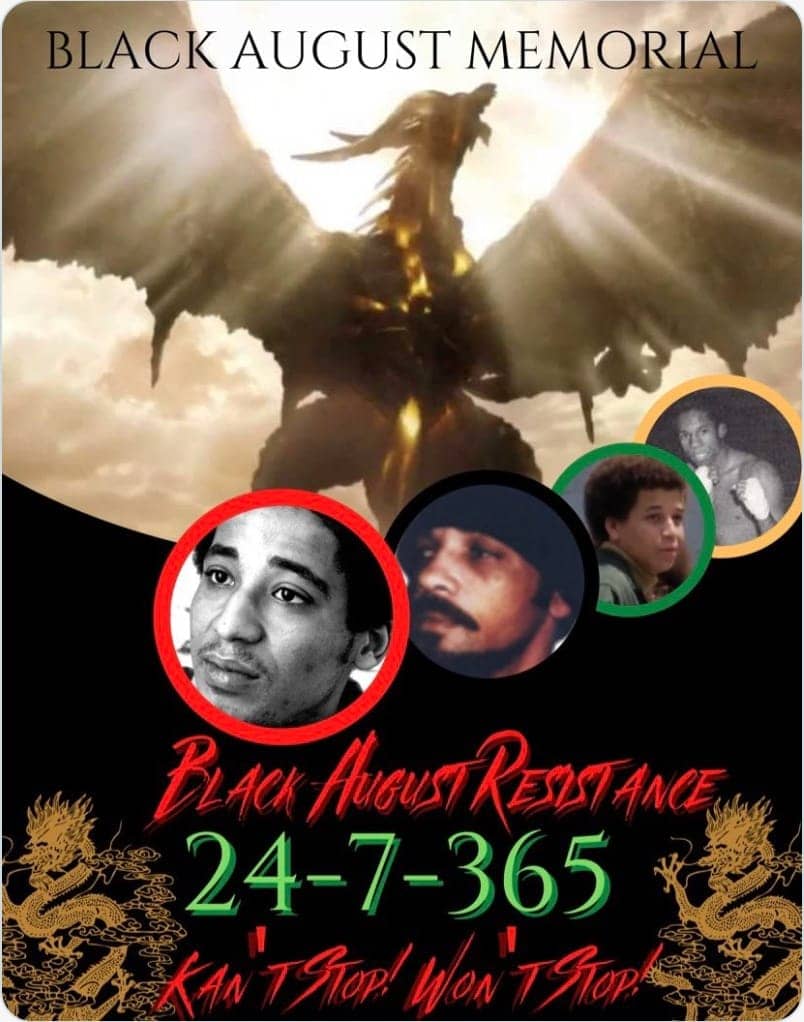
by Black August Organizing Committee
These are the forefathers of our Black Liberation Movement. Our ideological development is a direct manifestation of their daily sacrifices. They fought not only against the genocidal system of slavery, they fought for land and independence.
In the late 1800s and early 1900s, our ancestors who had successfully built communities and/or towns under the direct control of our people were influenced by our Black forefathers, not by Marxist, Leninist, Maoists or any other foreign ideologies. They did not import ideologies from other countries. In fact, Mao criticized those who came back with eurocentric ideological views.
Ideologies are indigenous to the concrete conditions that exist in their country. We need not have to use foreign ideologies to facilitate our independence. I ask, why would we as New Afrikan revolutionaries adopt these foreign ideologies that didn’t even work for those in their individual countries? Our understanding of ideology and its application has evolved since the 1960s, and since then, we have learned that ideology is a direct manifestation of a concrete analysis of the concrete conditions.
Even with the science of Marxism, Leninism and Maoism, they emphasized via historical materialism, ideology cannot be imported, but rather it is manifested from the concrete conditions that confront a particular people. I am not here to debate, I am specifically speaking to those who claim to be New Afrikan or citizens of the Republik of New Afrika.
Abdul Olugbala Shakur of George Jackson University, New Afrikan Independence Movement
Our Forefathers:
David Walker – David Walker’s objective was nothing short of revolutionary. He would arouse slaves of the South into rebelling against their master. His tool would be his own pamphlet, David Walker’s “Appeal.” – PBS.org
Gabriel Prosser – Leader of an “unsuccessful” slave revolt in Richmond, Virginia, in 1800, was also literate and a blacksmith by trade.
Denmark Vesey – A free Black carpenter and Methodist leader, used his position to organize more than 1,000 free and enslaved blacks, who were especially angry about the recent decision to suppress their African Church, to be a part of this uprising.
Martin Delany – Martin Robison Delany was an abolitionist, journalist, physician, soldier and writer, and arguably the first proponent of Black nationalism. Delany is credited with the Pan-African slogan of “Africa for Africans.”
Henry Highland Garnet – Abolitionist. He urged the slaves to rebel and claim their own freedom. Later in life, Garnet would support the migration of Black Americans to Liberia.
Tunis Campbell – One of the most successful Black politicians in the Reconstruction Era. He initially worked for the American Colonization Society but eventually rejected their efforts to shore up U.S. slavery by sending only free Blacks to Liberia. He then became an anti-colonization and abolitionist lecturer.
Edward P. McCabe – African American politician and businessman most notable for his promotion of Black settlement in Oklahoma and Kansas. Established himself as an attorney and land agent.
Benjamin Pap Singleton – An African American activist and businessman, and escaped slave. Between 1877 and 1879 Singleton had, through the Edgefield Real Estate and Homestead Association, steered more than 20,000 migrants to Kansas. In 1885 Singleton formed the United Trans-Atlantic Society in order to bring African Americans back to their “Fatherland” of Africa.
Henry McNeal Turner – (b.1831) Black Nationalist, repatriationist and minister, Henry M. Turner was 31 years old at the time of the Emancipation. By 1880 Turner had become one of the leading advocates of emigration, particularly to Liberia. He founded two newspapers, The Voice of Missions (1893-1900) and the Voice of the People (1901-1904) to promote emigration.
More info can be found at www.blackpast.org.
We Salute You!
Abdul Olugbala Shakur
Sistahs and Bruthas, it would be wise to keep in mind, the evidence of his-story which teaches us to forget our names, those of our ancestors, what country we belong to, what we had, what we lost and a whole host of lies and half-truths designed to misinform and demean our person.
Losing Our-story only requires that we neglect to package it and pass it on. Then when we die, it will die with us! For 40-plus years, since 1979, we have guarded the legacy of Black August. We have studied its lessons. We have re-taught what has been mis-taught. We have practiced and advanced its tenets – which we strive to practice each and every day of the year.
Can’t stop, Won’t stop.
As noted during the annual commemoration of Black August, these tenets of Black August below are applied to our daily lifestyle and practices:
Sacrificing; Fasting; Maintaining discipline; Uniting; Attending to health, Exercise and conditioning; Studying.
The practice of Black August centers upon building a New Afrikan collective consciousness around the three imperatives of:
Life/Identity – (Liberate the New Afrikan man/woman within)
Purpose – (Bring about revolutionary change within and around our independence)
Direction – (Nation-building towards self-determination and survival as a collective)
Just as those freedom fighting New Afrikan standard-bearers utilized these and other revolutionary tenets to develop their individual and collective consciousness while being held captive behind the walls of California prisons, so we too work diligently to share these tools with you, the oppressed, in the spirit of Each one, Reach one, Teach one.
The practice of Black August Resistance (BAR) is just as important today as when it was conceptualized 40 years ago in the service of the New Afrikan Liberation struggle. It is relevant toward collective unity, education, healing, change, building and empowering CommUNITY, all while supporting the call to abolish legal slavery under the 13th Amendment and Liberate our Elders from decades of torture and captivity.
Black August Organizing Committee





